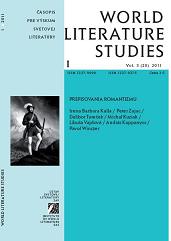Bardi, pážatá, Cigáni Intelektuálne rolové modely maďarského romantizmu
Bards, pages, gypsies: Intellectual role models of Hungarian romanticism
Author(s): András KappanyosSubject(s): Literary Texts
Published by: SAV - Slovenská akadémia vied - Ústav svetovej literatúry
Keywords: Romanticism and Nationalism. Nation and Progress. Intellectual Role Models. Heroism. Exile. Moral Challenge. Sacrifice. Historical Ballad. Allegory. 1848.
Summary/Abstract: The paper examines the possible intellectual role models that the three most prominent Hungarian romantic poets suggested either with the story of their life (and, in one case, death), or with allegorical constructions in their poetry. In the background of this investigation is a distinctly Central-European consideration: for centuries in Hungary, most social, philosophical or even technological new ideas came from the oppressor, that is, Imperial Vienna. In this way, in Hungary the “Interest of the Nation” and the “Interest of Progress” got into a contradictory relationship. In the “Reform Era” (1825-1848), this contradiction was partly and temporarily resolved by the idea of a “National Romanticism”. The three poets, Mihály Vörösmarty, János Arany and Sándor Petőfi, shared a most decisive historical experience: the revolution and the war of independence of 1848–1849, which was overwhelmed by the joint Austrian–Russian forces. Petőfi, the youngest, a symbolic figure even in his lifetime, was killed in action and thus became a heroic example for the coming generations. Vörösmarty, the oldest, lost his social status, his livelihood, and his faith: withdrawn from public life, in deep desperation he wrote some poems with unprecedented verbal intensity. Arany, who was a rather private family man, tried to survive the whole ordeal with the least possible harm to his way of life, and, more importantly, to his moral integrity. This search for a compromise that allows the intellectual to maintain moral integrity in a morally deficient and generally hostile environment while avoiding physical or social harm is very familiar from a 20th or 21st century viewpoint. In the 1850’s, Arany tries to construct this stance in several poems, of which the paper examines two historical ballads, “The Bards of Wales” and “The Two Pages of Szondi”. In addition, we also analyze Vörösmarty’s last finished poem, “The Old Gipsy”, in which he addresses very similar ideas.
Journal: World Literature Studies
- Issue Year: III/2011
- Issue No: 1
- Page Range: 68-75
- Page Count: 8
- Language: Slovak

